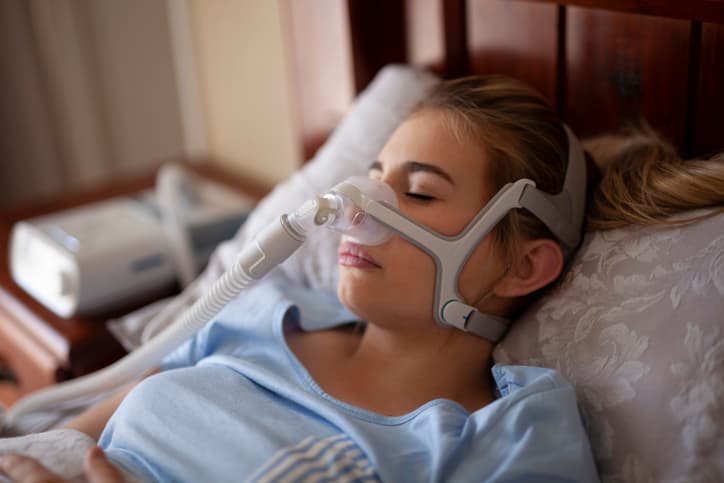
CPAP dry mouth is a common side effect of using a CPAP machine, as the National Heart, Lung and Blood Institute points out. In some cases, you might have a dry mouth because you need some time to get used to the CPAP. In other instances, making adjustments to the CPAP can help improve dry mouth.
How a CPAP Machine Works
Although there are other types of sleep apnea, the most common one is obstructive sleep apnea. When you have obstructive sleep apnea, your airway becomes blocked while you sleep, so that you actually stop breathing on and off throughout the night. A CPAP machine helps to treat obstructive sleep apnea by pushing air through the nose or through the nose and mouth during the night. Depending on the type of machine you have, the mask might cover your nose or cover your nose and mouth.
What Causes CPAP Dry Mouth?
If you are waking up with dry mouth while using CPAP then air leakage may be occurring around your mask. The leak causes moisture to escape and leave your mouth parched. Nasal and nasal pillow masks are the types of mask that most commonly cause dry mouth.
Dry mouth is a normal occurrence for people who just start out on CPAP therapy simply because they are not used to the pressurized air required to help open the air passage. Dry mouth is exacerbated for people whose jaw drops open during sleep. Not only does this create a much less efficient therapy because of leakage, but it also causes dry mouth.
How to Prevent CPAP Dry Mouth
As long as your dry mouth is caused by the CPAP machine and not by something else, such as any medication you’re taking or another medical condition, it shouldn’t be too difficult to figure out how to prevent it. One option is to try switching the type of mask you wear, or a simple solution would be to wear a chinstrap which essentially holds the jaw in place. Holding the jaw shut will not only help the effectiveness of therapy, it will combat the causes of dry mouth.
Some CPAP machines feature heated humidifiers, which moisten the air that flows from the machine. If you’re experiencing dry mouth or dry nasal passages when you wake up, it might be worth talking to your doctor to see if a CPAP with a humidifier is a good option for you.
Making sure your mask fits you properly may also prevent dry mouth from occurring. Your doctor can help fit the mask to your face or recommend a different option if your current mask just isn’t working right.
If your machine is causing dry mouth or another discomfort, don’t give up on it. Your doctor can help you adjust your mask or find a style of machine that treats your sleep apnea without drying out your mouth.
